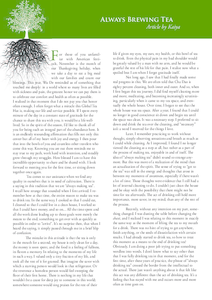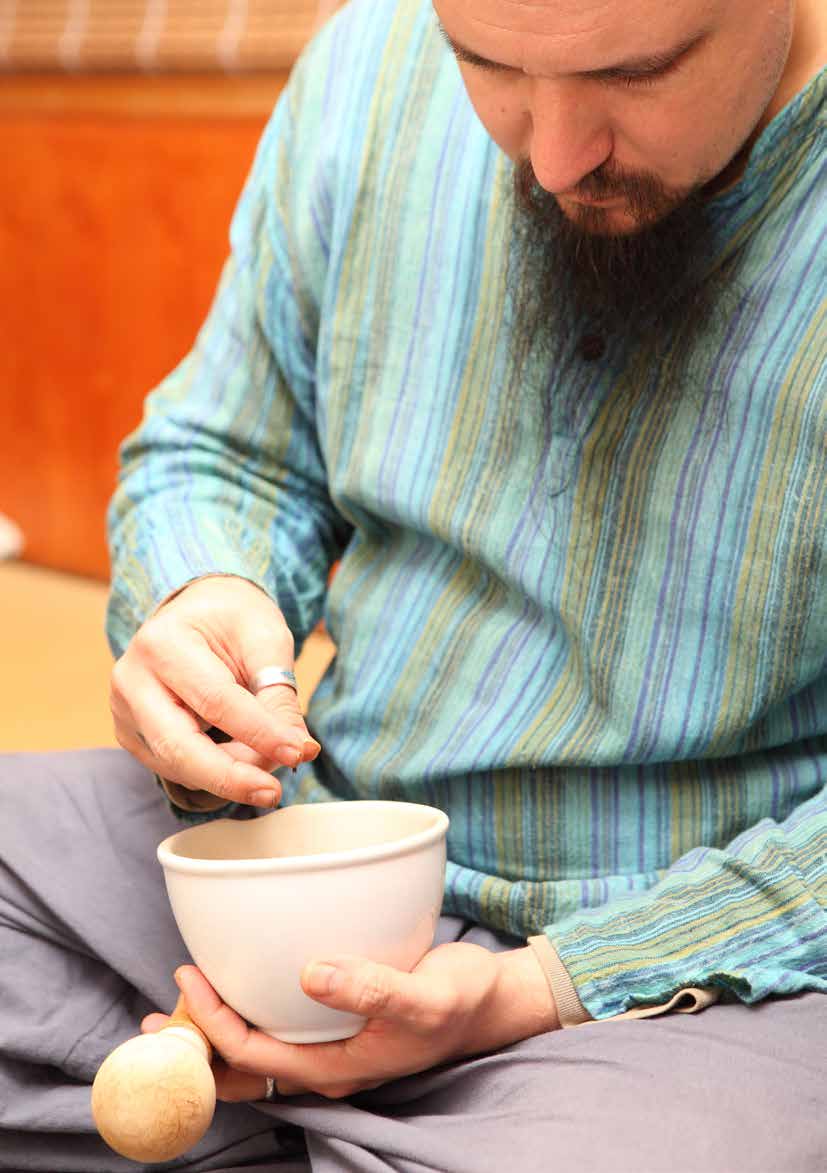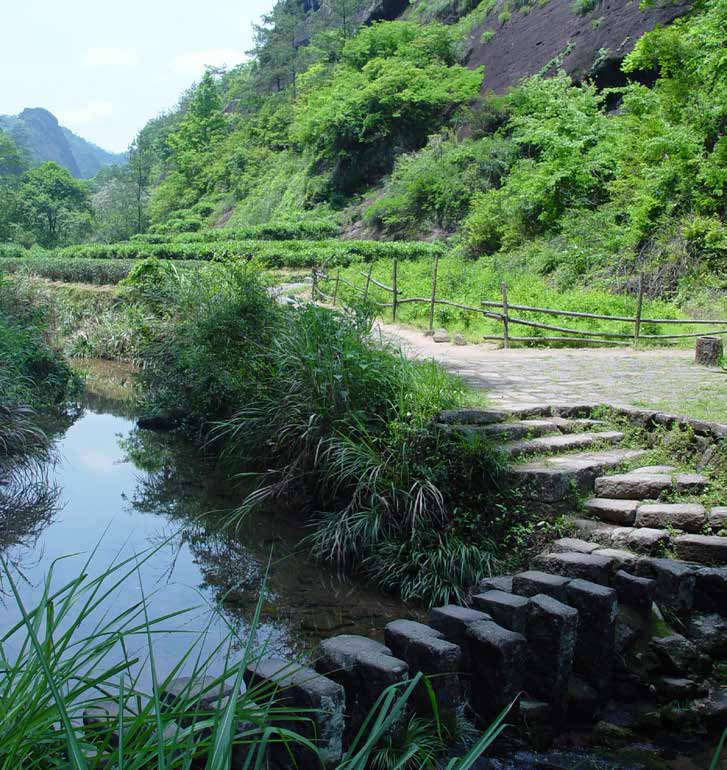
 |
|
For those of you unfamiliar with American festivals, November is the month of our Thanksgiving holiday, when we take a day to eat a big meal with our families and count our blessings. This year, Wu De reminded us of something that touched me deeply: in a world where so many lives are filled with sickness and pain, the greatest honor we can pay them is to celebrate our comfort and health as often as possible. I realized in that moment that I do not pay you that honor often enough. I often forget what a miracle this Global Tea Hut is, making our life and service possible. If I spent every minute of the day in a constant state of gratitude for the chance to share this tea with you, it would be a life welllived. So in the spirit of the season, I'd like to thank all of you for being such an integral part of the abundance here. It is an endlessly resounding affirmation that fills not only this center but all of my heart with joy and energy. I then pour that into the bowls of you and countless other travelers who come this way. Knowing you are out there reminds me to stay true to my path, work hard with intention, and steadily grow through my struggles. How blessed I am to have this incredible opportunity to share and be shared with. I look forward to meeting you for the first time, or sitting down together once again.
Tea comes to our assistance when we find any quality in ourselves that is in need of cultivation. There is a saying in this tradition that we are "always making tea". I recall how strange that sounded when I first arrived. I remember how at that time, the entire reason to make tea was to drink tea. In the same way, I cooked so that I could eat, I cleaned so that I could live in a clean house, I worked so that I could have money, and so on... All the time spent and all the work done leading up to those goals were merely the means to the end, something to get over with as quickly as possible in order to "arrive". It's no surprise then, that when I heard the saying, it simply passed through me in a brief blip of confusion.
The mistake in this attitude is that the tea is only in the mouth for a second, my house is only clean for a day, the money is soon spent, and the food is a feeling of fullness, its flavors a memory. In relating to the moments of my life in such a way, I valued only a tiny fraction of my life, and took all the rest of it for granted. But imagine the savor with which a starving person would look in that refrigerator. Or the reverence a homeless person would feel sweeping the floor of their first home. There is nothing in my life that wouldn't be a cause for deep joy to someone in this world; somewhere someone would sing praises for the rest of their life if given my eyes, my ears, my health, or this bowl of tea to drink. Even the physical pain in my bad shoulder would be greatly valued by a man with no arm, and he would be grateful the rest of his life for that pain. I realize now what a spoiled brat I am when I forget gratitude itself.

Not long ago, I saw that I had finally made some real progress in this. We are often told that Cha Dao is eighty percent cleaning, both inner and outer. And so, when I first began this tea journey, I did find myself cleaning more and more, meditating, and becoming increasingly scrutinizing, particulary when it came to my tea space, and eventually the whole house. Over time, I began to see that the whole house was tea space. After a year, I found that I could no longer in good conscience sit down and begin tea until the space was clean. It was a necessary step. I preferred to sit down and drink the tea over the cleaning, and "necessary" isn't a word I reserved for the things I love.
Later, I remember practicing to work without thought, simply observing sensations and breath as much as I could while cleaning. As I improved, I found I no longer viewed the cleaning as a step at all, but rather as a part of the process of making tea, enjoyable in and of itself. The idea of "always making tea" didn't sound so strange anymore. But this was more of a realization of the mind than an actualization of the spirit. The sense of trying to "get to the tea" was still in the energy and thoughts that arose in between my moments of awareness, especially if there wasn't a lot of time. Those thoughts were evidence that I still had a lot of internal cleaning to do. I couldn't just clean the house and be okay with the possibility that there might not be time for tea afterwards. The act of drinking still held more importance, more savor, in my mind, than any of the rest of the process.
Recently, without any intention on my part, something changed. I was dusting the table before changing the chaxi, and I realized I was relating to this moment in exactly the same way as the moment of lifting the tea to my mouth for a drink. There was no hint of trying to get anywhere, finish anything, or the seeds of dissatisfaction with certain results. I had already started to drink tea, so how to treat this moment as a means to the end of drinking tea? Obviously, I am doing a poor job trying to put something wordless into words. I don't know what to say other than that I was fully drinking tea in that moment, and for the first time, after these years of practice, the phrase of "always drinking tea" crossed the border from the intellectual to the actual. There just wasn't anything about it that felt like this act was any different than the act of drinking tea. It's a feeling that has stayed with me and occurs more and more often as time goes on.
Of course, I still have a really long way to go. I feel this is only the first step. All the work up to now was searching for my footing, shifting my balance, adjusting my pack, reading the map, and finding the beginning of the path. Having expanded my sense of drinking tea from the tea table to cleaning the space around the tea table isn't very far. It also could extend into grocery shopping, driving my scooter, teaching English, showering before bed, or waking in the morning. But it doesn't yet, not to the same degree. And as I paid homage to in the beginning of this article, it must extend that far, lest I dishonor all of you, as well as all those who are not as fortunate as I am - those who would never treat these moments with anything less than reverence and gratitude. May I learn to infuse all my acts with harmony, with reverence, and purity. May they lead to and arise from stillness. May they all be tea!
Wu De often reminds us that there isn't any guarantee that walking around with a lightning rod in your hand will get you struck by lightning. Lots of people get struck by lightning even without lightning rods, but carrying one increases the chances. One person might drink a single bowl and be struck immediately with a wisdom and insight of the deepest kind. (I've seen it happen.) Another person might have to follow all the "rules" and work hard for years before achieving the same. It's beautiful to know that we all live in a universe that contains this kind of Grace, but it's also good to approach our tea with some kind of intention as often as possible for the best results.
A good point of entry into beginning to actualize "every moment making tea" is boiling the water. It's a bit more directly, obviously involved in the tea preparation than cleaning the tea space is, so this might work better or be easier at first. The boiling of the water for tea was traditionally a time of meditation and stillness. Most of us are probably more familiar with the saying "a watched pot never boils." This speaks to the dis-ease of the mind as it waits impatiently to get to the moment it wants more than this moment. When boiling the water, in order to make tea, impatience arises. I am not boiling the water, I am waiting for the water to boil, so that I can get on to the next thing! The mind wants the water to be boiled right away so that tea drinking can begin. It wants to check the kettle again and again, so as not to "waste" its time. The irony!

Often, we make tea for large groups of people, or perhaps visitors who are intensely uncomfortable with silence. Tea is the perfect bridge between the meditative mind and the uncomfortable one, as it appears to offer an uncomfortable mind something to "do" while coaxing it into the place where the need to do anything is forgotten. We usually use two kettles, and keep a constant stream of water and tea flowing through the pot. Guests then ask if they "need" two kettles as well. My advice is to have two kettles to be prepared for every situation. But, taking the time to drink tea with only one can be a great practice.
When I drink tea alone or with one or two tea friends, I often use only one kettle. I approach the session with the intention to not treat the moments waiting for the water to boil as a means to an end of drinking tea. Instead, I simply sit with the sensations of the heat of the kettle nearby, the vibrations in the handle, the progression of sounds that it makes, or contemplating the connection between this act of boiling the water and the lifting of the bowl to my lips. All the actions in this session are one continuous process, and every one is equally deserving of my reverence and gratitude. None is less or more. I am so fortunate right now to be sitting here, feeling the warmth of this kettle, listening to the 'wind soughing in the pines'.
Every act of every day is a part of the process of making tea. Just as tea is a part of the process of all of those acts as well. Where is the separation? And beyond this it is important to see that these acts are all a part of the process of life itself, none of them are a means to an end. Every one of them is already the point, a potential entry point into gratitude for the life they all elicit in us. There is no moment in this life when we are more alive than another. It is a terrible waste of life to discard any moment in order to get more quickly to another, equally alive moment.
Personal growth is the same; it is a process. The way we relate to the moments in our lives determines the outcome. Lightning strikes from time to time and we grow whether we meant to or not. But growth is the reason we are alive, so why leave it to chance? Approach tea with intention, and you will find that where the acts of each day felt totally separate from the tea, they have now become preludes to tea, and then finally that they've become tea. Before long, these simple moments of practice and intention sitting at the tea table add up and overflow into the rest of the day.
Finally, I have come to see that I owe it not only to you and those less fortunate than me, but perhaps most of all I owe it to myself. Or rather that I can't have one without the other. After all, how can I hope to increase the happiness and healthiness of this world if I am not happy or healthy myself? How can I be, if I am taking for granted that which so many would be so grateful for? How can I sit upright at my death and say farewell to this world and all the people I love knowing that I did not make the most of our time together? Just as all of life is tea, and all tea is life, so too is your happiness my happiness, your health my health. We are in this together. For that I am deeply grateful.
